| Listing 1 - 10 of 12 | << page >> |
Sort by
|
Book
ISBN: 9780691160184 069116018X 069113989X 1283195119 1400839513 9786613195111 Year: 2014 Publisher: Princeton (N.J.): Princeton university press,
Abstract | Keywords | Export | Availability | Bookmark
 Loading...
Loading...Choose an application
- Reference Manager
- EndNote
- RefWorks (Direct export to RefWorks)
When it appeared in 1670, Baruch Spinoza's Theological-Political Treatise was denounced as the most dangerous book ever published--"godless," "full of abominations," "a book forged in hell . . . by the devil himself." Religious and secular authorities saw it as a threat to faith, social and political harmony, and everyday morality, and its author was almost universally regarded as a religious subversive and political radical who sought to spread atheism throughout Europe. Yet Spinoza's book has contributed as much as the Declaration of Independence or Thomas Paine's Common Sense to modern liberal, secular, and democratic thinking. In A Book Forged in Hell, Steven Nadler tells the fascinating story of this extraordinary book: its radical claims and their background in the philosophical, religious, and political tensions of the Dutch Golden Age, as well as the vitriolic reaction these ideas inspired. It is not hard to see why Spinoza's Treatise was so important or so controversial, or why the uproar it caused is one of the most significant events in European intellectual history. In the book, Spinoza became the first to argue that the Bible is not literally the word of God but rather a work of human literature; that true religion has nothing to do with theology, liturgical ceremonies, or sectarian dogma; and that religious authorities should have no role in governing a modern state. He also denied the reality of miracles and divine providence, reinterpreted the nature of prophecy, and made an eloquent plea for toleration and democracy. A vivid story of incendiary ideas and vicious backlash, A Book Forged in Hell will interest anyone who is curious about the origin of some of our most cherished modern beliefs.
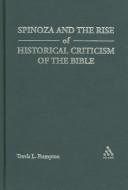
ISBN: 9780567025937 0567025934 Year: 2006 Publisher: New York: T&T Clark International,
Abstract | Keywords | Export | Availability | Bookmark
 Loading...
Loading...Choose an application
- Reference Manager
- EndNote
- RefWorks (Direct export to RefWorks)
Book
ISBN: 9781350011069 9781350011045 9781350011052 1350011061 1350011045 Year: 2018 Publisher: London: Bloomsbury academic,
Abstract | Keywords | Export | Availability | Bookmark
 Loading...
Loading...Choose an application
- Reference Manager
- EndNote
- RefWorks (Direct export to RefWorks)
Spinoza's political thought has been subject to a significant revival of interest in recent years. As a response to difficult times, students and scholars have returned to this founding figure of modern philosophy as a means to help reinterpret and rethink the political present. Spinoza's Authority Volume II makes a significant contribution to this ongoing reception and utilization of Spinoza's 1670s Theologico-Political and Political treatises. By taking the concept of authority as an original framework, this books asks: How is authority related to law, memory, and conflict in Spinoza's political thought? What are the social, historical and representational processes that produce authority and resistance? And what are the conditions of effective resistance?
Power (Philosophy) --- Political and social views --- Political science --- Resistance (Philosophy) --- Philosophy --- Spinoza, Benedictus de, --- Political philosophy. Social philosophy --- Spinoza, Baruch --- Political science - Philosophy --- Spinoza, Benedictus de, - 1632-1677 --- Spinoza, Benedictus de, - 1632-1677. - Tractatus theologico-politicus
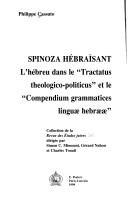
ISBN: 9042907959 9789042907959 Year: 1999 Volume: 19 Publisher: Louvain: Peeters,
Abstract | Keywords | Export | Availability | Bookmark
 Loading...
Loading...Choose an application
- Reference Manager
- EndNote
- RefWorks (Direct export to RefWorks)
Bible --- Bijbel --- Hebreeuws --- Hébreu (langue) --- Linguistique --- Spinoza, Baruch --- Taalkunde --- Hebrew language --- Grammar --- History --- Spinoza, Benedictus de, --- Contributions in Hebrew grammar --- Hebrew language - Grammar - History --- Spinoza, Benedictus de, - 1632-1677 --- Spinoza, Benedictus de, - 1632-1677 - Contributions in Hebrew grammar --- Spinoza, Benedictus de, - 1632-1677. - Tractatus theologico-politicus --- Spinoza, Benedictus de, - 1632-1677. - Compendium grammatices linguae hebrææ
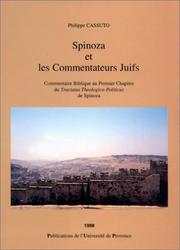
ISBN: 2853994244 2821817665 2821827520 9782853994248 Year: 1998 Publisher: Aix-en-Provence: Université de Provence,
Abstract | Keywords | Export | Availability | Bookmark
 Loading...
Loading...Choose an application
- Reference Manager
- EndNote
- RefWorks (Direct export to RefWorks)
Dans cet ouvrage, nous nous proposons de parcourir le Tractatus Theologico-Politicus de Spinoza afin de donner au lecteur philosophe tous les éléments susceptibles de l'aider à saisir la place des citations bibliques dans cette œuvre, ainsi que ses conséquences sur la pensée philosophique de l'auteur. D'autre part nous voulons montrer au lecteur hébraïsant l'utilisation que Spinoza a faite des sources bibliques au sens large, mais traditionnel. Nous utiliserons également la grammaire de l'Hébreu que Spinoza a laissé inachevée : Compendium Grammatices Linguoe Hebroeoe, Abrégé de Grammaire Hébraïque, publié dans les Opera Posthuma, 1671. Nous tenterons une approche de son œuvre en dehors des luttes et des passions que son seul nom inspire, lui qui sa vie durant s'écartera par tous les moyens des combats de son époque afin de pouvoir accéder à la connaissance vraie qui seule apporte le bonheur.
Judaism and philosophy --- Judaïsme et philosophie --- Early works to 1800 --- Ouvrages avant 1800 --- Spinoza, Benedictus de, --- Religion --- Bible. --- Quotations --- Spinoza, Benedictus de --- Judaïsme et philosophie --- Early works to 1800. --- Religion. --- Spinoza, Benedictus de, - 1632-1677. - Tractatus theologico-politicus --- hébraïsme --- citations bibliques --- spinozisme --- Traité théologico-politique --- commentateurs bibliques
Book
ISBN: 9782864327189 286432718X Year: 2013 Publisher: Lagrasse: Verdier,
Abstract | Keywords | Export | Availability | Bookmark
 Loading...
Loading...Choose an application
- Reference Manager
- EndNote
- RefWorks (Direct export to RefWorks)
Spinoza sait qu’une question inquiète l’Europe de son temps :comment les Juifs sont-ils encore possibles ? Publiant, en 1670,le Traité théologico-politique, il met à profit l’occasion pour proposersa réponse, sous la forme d’un court manifeste, inséré à la find’un chapitre.Les premiers mots situent l’enjeu : « Aujourd’hui les Juifs ».L’aujourd’hui de Spinoza est devenu un passé. Mais la question demeure.Elle inquiète plus que jamais et bien au-delà de l’Europe. À en croire certains, il y va de la paix et de la guerre pour tous.Aussi est-il opportun de comprendre ce que dit Spinoza. Car ses propos sont obscurs. À dessein.Spinoza veut qu’on soit déconcerté, afin qu’on cherche ce qu’il veut vraiment signifier. Il écrit ainsi parce qu’il est persuadé d’avoir à tenirdes propos offensants. Offensants pour les Juifs, qu’il connaît bien puisqu’il est né parmi eux, mais surtout offensants pour les honnêtes gens.Quand la vérité blesse au point qu’elle ne puisse se dire, le seul moyen pour celui qui ne veut pas se taire, c’est de passer par la fausseté. Le manifeste de Spinoza est un tissu de contrevérités. Elles sont destinées à éveiller l’attention. En les relevant et en les rectifiant une à une, le lecteur découvrira ce que doit être, selon Spinoza, la politique à mener à l’égard des Juifs. Il identifiera les événements et les raisons qui éclairent les choix de 1670.Il mesurera à quel point ces choix anciens déterminent notre présentet notre avenir.Au cours de mon enquête, j’ai décidé de me taire sur mes propres sentiments. J’admets qu’on puisse être choqué par ce que j’ai mis au jour.
Judaism and philosophy --- Judaïsme et philosophie --- Spinoza, Benedictus de, --- Spinoza, Baruch, --- Jews --- Philosophy and religion --- Judaism --- Identity --- Cultural assimilation --- Controversial literature --- History and criticism --- Judaïsme et philosophie --- Jews - Identity --- Jews - Cultural assimilation --- Judaism - Controversial literature - History and criticism --- Spinoza, Benedictus de, - 1632-1677. - Tractatus theologico-politicus --- Spinoza, Baruch, 1632-1677
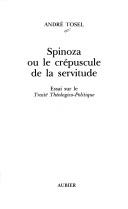
ISBN: 2700703669 9782700703665 Year: 1984 Publisher: [Paris]: Aubier,
Abstract | Keywords | Export | Availability | Bookmark
 Loading...
Loading...Choose an application
- Reference Manager
- EndNote
- RefWorks (Direct export to RefWorks)
Philosophy and religion --- Free thought --- Spinoza, Benedictus de, --- 1 SPINOZA, BARUCH --- Freethought --- Thought, Free --- Agnosticism --- Atheism --- Rationalism --- Secular humanism --- Skepticism --- Christianity and philosophy --- Religion and philosophy --- Religion --- Filosofie. Psychologie--SPINOZA, BARUCH --- Spinoza, Benedictus de --- 1 SPINOZA, BARUCH Filosofie. Psychologie--SPINOZA, BARUCH --- Spinoza, Benedictus de, - 1632-1677. - Tractatus theologico-politicus
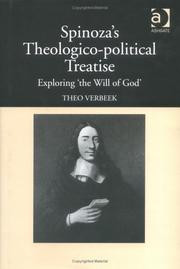
ISBN: 0754604934 9780754604938 Year: 2003 Publisher: Aldershot: Ashgate,
Abstract | Keywords | Export | Availability | Bookmark
 Loading...
Loading...Choose an application
- Reference Manager
- EndNote
- RefWorks (Direct export to RefWorks)
Spinoza, Baruch --- God --- Will --- History of doctrines --- Spinoza, Benedictus de, --- 215.1 --- 1 SPINOZA, BARUCH --- -Metaphysics --- Misotheism --- Monotheism --- Religion --- Theism --- Verhouding godsdienst en filosofie --- Filosofie. Psychologie--SPINOZA, BARUCH --- -History of doctrines --- -Spinoza, Benedictus de --- -Verhouding godsdienst en filosofie --- 1 SPINOZA, BARUCH Filosofie. Psychologie--SPINOZA, BARUCH --- 215.1 Verhouding godsdienst en filosofie --- -215.1 Verhouding godsdienst en filosofie --- Divine commands (Ethics) --- God - Will - History of doctrines - 17th century. --- Spinoza, Benedictus de, - 1632-1677. - Tractatus theologico-politicus.

ISSN: 0298315X ISBN: 2204053082 9782204053082 Year: 1996 Publisher: Paris: Cerf,
Abstract | Keywords | Export | Availability | Bookmark
 Loading...
Loading...Choose an application
- Reference Manager
- EndNote
- RefWorks (Direct export to RefWorks)
Aborde la question du travail exégétique dans la philosophie de Spinoza. Pour Leo Strauss, l'appréciation de la critique philologico-historique que Spinoza fait de la Bible est inséparable de la prise en compte des critiques de Hobbes envers Spinoza ou de la position de Calvin sur le rapport raison-Révélation.
Judaïsme et philosophie. --- Spinoza, Baruch de --- Judaisme et philosophie --- Religion --- Philosophie --- Spinoza, Benedictus de, --- 1 SPINOZA, BARUCH --- Filosofie. Psychologie--SPINOZA, BARUCH --- 1 SPINOZA, BARUCH Filosofie. Psychologie--SPINOZA, BARUCH --- Judaïsme et philosophie. --- Religion - Philosophie --- Religion - Controversial literature --- Spinoza, Benedictus de, - 1632-1677. - Tractatus theologico-politicus --- Hobbes, Thomas (1588-1679) --- Spinoza, Baruch (1632-1677) --- Spinoza, Baruch (1632-1677). Tractatus theologico-politicus --- Bible --- Philosophie juive --- Ouvrages de controverse --- Influence --- Histoire et critique

ISBN: 0226777111 9780226777115 Year: 1988 Publisher: Chicago (Ill.): University of Chicago press,
Abstract | Keywords | Export | Availability | Bookmark
 Loading...
Loading...Choose an application
- Reference Manager
- EndNote
- RefWorks (Direct export to RefWorks)
Political philosophy. Social philosophy --- Jewish religion --- Christenen--Vervolgingen --- Christians--Persecutions --- Chrétiens--Persécutions --- Filosofie [Joodse ] --- Filosofie [Middeleeuwse ] --- Filosofie en godsdienst --- Godsdienst en filosofie --- Godsdienstige vervolging --- Jewish philosophy --- Jodendom en filosofie --- Joodse filosofie --- Judaism and philosophy --- Judaïsme et philosophie --- Medieval philosophy --- Middeleeuwse filosofie --- Persecution --- Persécution --- Persécution religieuse --- Philosophie et religion --- Philosophie juive --- Philosophie médiévale --- Philosophy [Jewish ] --- Philosophy [Medieval ] --- Philosophy and religion --- Religion and philosophy --- Religion et philosophie --- Religious persecution --- Vervolging --- Judaism and philosophy. --- Philosophy, Jewish. --- Philosophy, Medieval. --- Philosophy and religion. --- Persecution. --- Maimonides, Moses --- Judah, ha-Levi --- Spinoza, Benedictus de --- Maimonides, Moses, 1135-1204. Dalÿalat al- hÿa irÿin. --- Judah, ha-Levi, 12th cent. Kitÿab al- hujjah. --- Spinoza, Benedictus de, 1632-1677. Tractatus theologico-politicus.
| Listing 1 - 10 of 12 | << page >> |
Sort by
|

 Search
Search Feedback
Feedback About UniCat
About UniCat  Help
Help News
News